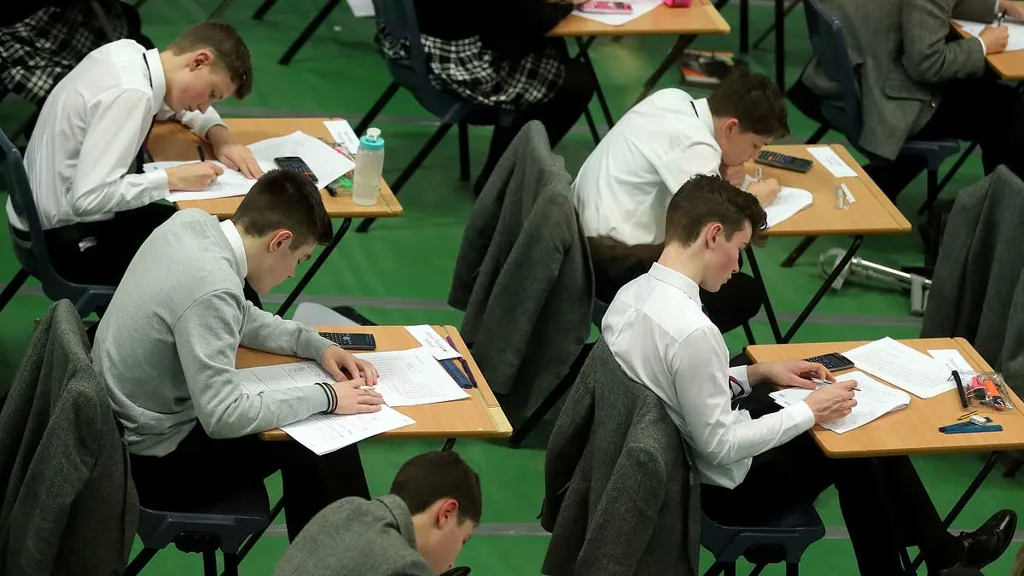Pupils face 'fiercer than ever' competition for a sixth form place this year partly due to Labour's tax raid on private schools, experts claim.
As hundreds of thousands of teenagers collect their GCSE results tomorrow, the scramble to bag an A-level place is expected to be the one of the worst on record.
The 20 per cent VAT on private school fees, which came into force in January, could push more pupils into the state sector if they cannot afford it.
In addition, the population of 16-year-olds has increased this year and grades are forecast to remain higher than before the pandemic.
It all means large numbers are expected to get the grades needed for a sixth form place, with competition especially bad at the most selective institutions.
Lee Elliot Major, professor of social mobility at Exeter University, told PA Media: 'Competition for the most selective sixth forms will be fiercer than ever, with fears over VAT on private schools likely driving more families to seek out places in the state sector.'
Bill Watkin, chief executive of the Sixth Form Colleges Association (SFCA) added: 'As the population continues to grow - and the opportunities to increase capacity, to build new classroom blocks, is held back - it is going to go on getting more competitive.'
And Catherine Sezen, director of education policy at the Association of Colleges (AoC), said: 'It will be much tighter [this year].'
Pupils face 'fiercer than ever' competition for a sixth form place this year partly due to Labour's tax raid on private schools, experts claim (pictured: GCSE pupils celebrating their results in a previous year)
As hundreds of thousands of teenagers collect their GCSE results tomorrow, the scramble to bag an A-level place is expected to be the one of the worst on record (file picture)
Roughly one in five entries are expected to achieve at least a 7, equivalent to the old A.
Last year, 21.7 per cent of grades in England hit this mark, a small rise on 2023 and the highest in 12 years.
Grading has never returned to how low it was before the pandemic, when grades were wildly inflated due to teachers deciding grades.
Alan Smithers, professor of education at Buckingham University, said: 'It could be that we are seeing the emergence of a new normal, in which case this year's grading will resemble that of last year.
'Of course, there is always the chance that the regulators could make a further push to get back to pre-pandemic levels.
'However, since the top grades were not lowered in 2023 and 2024 when there was pressure to do so, it is more likely that they will stay high this year.'
Across the UK, the proportion getting at least 7 last year was 21.8 per cent, but this was a fall from the previous year due to other nations bringing their grading down.
This year, pupils in two areas will be receiving their results by app on their phones for the first time as part of a trial ahead of a national roll-out.
The 20 per cent VAT on private school fees, which came into force in January, could push more pupils into the state sector if they cannot afford it (pictured: Education Secretary Bridget Phillipson)
The Education Record app will deliver results at 11am to 95,000 students in Manchester and the West Midlands.
It comes after A-level pupils celebrated a bumper crop of grades last week, with entries graded at A and A* rising to an all-time high outside of the pandemic years, to well over a quarter of the total.
As a result, the highest number of applicants ever - 439,180 - were accepted onto degree courses - up by 3.1 per cent on the same time last year.
Education Secretary Bridget Phillipson has previously said the new VAT on private school fees is necessary to fund other public services including state schools.
A Department for Education spokesman said: 'We know that capacity is a concern for some sixth form colleges, which is why we have provided £238 million of capital funding to create 24,000 additional places in post-16 education up to 2025.
'In addition, areas with the greatest demographic growth, specifically the Greater Manchester Combined Authority and Leeds City Council, both received an allocation of £10 million in April 2025 to increase capacity and relieve pressure.
'Further education is crucial to breaking down barriers to opportunity and delivering the growth that our economy needs through our Plan for Change, which is why we are spending £1.2 billion more on skills by 2028/29.'
